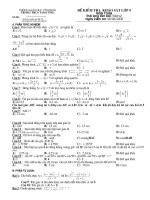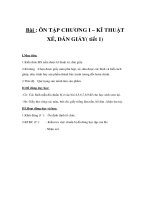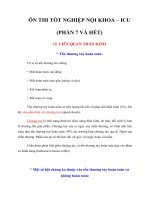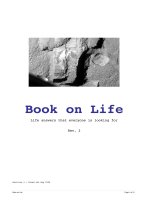Book on Life Life - answers that everyone is looking for Rev. 2 pptx
Bạn đang xem bản rút gọn của tài liệu. Xem và tải ngay bản đầy đủ của tài liệu tại đây (331.53 KB, 21 trang )
Book on Life
Life answers that everyone is looking for
Rev. 2
Revision 2 : Dated 6th Sep 2008
Book on Life Page 1 of 21
Author:
Prashant P. Shah ( )
Copyright:
(C) 2008 Prashant P. Shah
Legal Notice:
This book is under public domain.
This book may be freely reproduced, distributed, transmitted,
used, built upon by anyone and everyone without permission for any
purpose, commercial or non-commercial, and in any way, including
by methods that have not yet been invented or conceived.
The authors has taken care in the preparation of this book, but
make no expressed or implied warranty of any kind and assume no
responsibility for errors or omissions. No liability is assumed
for incidental or consequential damages in connection with or
arising out of the use of the information or programs contained
herein.
Contact:
Website : />Email :
Book on Life Page 2 of 21
PREFACE
None of the knowledge is mine. What I have learnt is from others. You
will find such similar ideas in many books. But I wanted a book that is
precise, simple to understand, makes sense and is freely available to
anyone. A straight to the point book. This is the effort of many years,
boiled, purified and refined to the very basic principles.
There are too many people to thank for, far too many to even list them
down in this book.
But I would like to thank the greatest teacher of all : my mistakes.
Everything that I have learnt over the years were from my own mistakes
and failures.
Book on Life Page 3 of 21
Chapter 1 : INRODUCTION
I wrote this book to be a guide to others in the journey of life.
Its just a guideline to be understood and followed. Some things might not
make sense immediately or the interpretation of the reader might be
different but the basic principles remain the same no matter what.
I suggest readers to follow this journey a small part at a time. What I
am about to present here is extremely difficult and cannot be done within
a day or a month or a year. It will take years of effort and sacrifice.
What lies at the end of this journey will become more clear as you
progress down this path.
I hope you make good use of this knowledge and distribute it to others in
need.
This is going to be a journey within yourself, so I wish good luck to
those who want to know the truth.
Book on Life Page 4 of 21
Chapter 2 : WORK
“Work without attachment.” - Bhagavad Gita
Do not seek or ask for the fruits of your effort.
Work as it it is your duty to do it.
Ask yourself everyday - "If I didnt get paid to do this, will I still be
doing this ?"
Do what you must.
Do not seek what you can get out of it, rather how much can you give.
It is in giving that one receives peace.
Do not try to control, or to win or to horde.
Do it because you really really want to do it.
A man who seeks the fruits of his effort is forever caught in the trap of
delusion, wanting and desires.
• A man should not care who gets the credits for it.
• A man should not care what money he will get for it in return.
• A man should not care what he gains out of it.
A man who gives up his own personal desires and thinks about the greater
good, will always enjoy his work.
A man must work for the benefit of others and the society. He must use
his skills for betterment of the society rather than to just serve
himself.
Everyone born in this world, have been given a specific purpose. It is a
man's duty to find that out and complete it in the best possible way. He
has also been given skills that will assist him the completion of his
duty. By getting caught in the trap of desires he forgets his real
duties.
It is far better to fail in your own duty, than to do others duty.
Book on Life Page 5 of 21
Chapter 3 : DESIRE
“Desire is the root cause of man's suffering.” - Buddha
When a desire arises, a man becomes attached to it.
If he gets it, he feels happy, then he wants more. If he does not get it,
he feels sad and blames others for it.
Its a endless cycle.
Once a man has a high paying job, he wants a bigger house, then a car,
then good clothes, then new furniture to match the status of his life,
then more money is needed, then he wants to join club houses, then he
wants another house, then some more money, then more the never ending
cycle.
Once a man gets trapped in the cycle of desires and wanting then is no
peace for him. He looses his sleep and patience, running after one thing
or another all his life.
A man who is free of all personal desires and wants is a happy man.
Book on Life Page 6 of 21
Chapter 4 : OTHERS
A man does not want anything.
The only reason he wants something is because others are having it.
He is always engaged in comparison with others.
• I have so much money, that person has so much more.
• I look like this, that person is better looking than me.
• I have few friends, that person is so lucky since he has more
wealthy and influential friends.
• I have a smaller houses, that person has a bigger and a better
house.
• I have such clothes, that person is better dressed than me.
• I am not educated or intelligent like others, that person is better
educated and intelligent than me.
• My father is poor, that person's father is more famous and rich.
• That other person is so much smarter than me.
• That other person is so much better than me.
• That other person has so many friends.
• That other person has something that I dont have
And so on and on it goes forever. Never satisfied with what he has, a man
sees others having more than him, he wants more and more.
This he keeps doing everyday. In the reality he does not want a bigger
house, cars, etc but since someone else has it, he too wants to have it.
This leads to greed, jealousy and envy.
Although he says nice words to others, but in his heart he does not like
others who are better than him.
He only feels better when he is at the top. No one else is above him in
any way. As soon as someone has 0.001% more than he has - he does not
like it.
This leads to competition and a race to win.
He who is content with himself is at peace.
Book on Life Page 7 of 21
Chapter 5 : DARK JUNGLE OF LIFE
Life is like a dark jungle and here are the enemies of a man that he is
going to meet in his journey which he must conquer on his own.
• Greed
• Anger
• Lust
• Egotism
• Falsehood
• Deception
• Lying
• Stealing
• Dishonesty
• Cheating
• Cruelty
• Killing
• Pride
• Arrogance
• Conceit
• Vanity
• Jealousy
• Envy
• Sloth
• Impatience
• Indecision
• Selfishness
• Revenge
• Hate
• Wrath
• Gluttony
• Idleness
• Attachment
There are more, its not possible to list all of them here, but I have
listed the major ones, the first three being the biggest enemies of all.
Book on Life Page 8 of 21
Where even one of the above enemy is present, others are bound to be
found. There are extremely difficult to locate and remove since they are
hidden within the man himself. They are like termites that eat up a man
from inside. It takes a man away from his true duties and leads him to a
false materialistic life - which always ends up in disaster.
A mind filled with such impurities is always agitated.
Every man must cross this dark jungle of life on his own. No one can help
him in this process.
A man must take a through note of himself at end of every month to see
which one of these enemies is still present.
Below is a rough description of each one of them to assist him in this
process.
Greed
• Greed is the selfish desire for or pursuit of money, wealth, power,
food, or other possessions, especially when this denies the same
goods to others.
• An excessive desire to acquire or possess more than what one needs
or deserves, especially with respect to material wealth.
• A selfish and excessive desire for more of something (as money) than
is needed.
Anger
• Anger is an emotional state that may range from minor irritation to
intense rage.
Lust
• Lust is any intense desire or craving for gratification and
excitement.
• Intense or unrestrained sexual craving.
• To have an intense or obsessive desire, especially one that is
sexual.
Egotism
• The tendency to speak or write of oneself excessively and
boastfully.
• An inflated or exaggerated sense of one's own importance.
• The practice of thought, speech, and conduct expressing high self-
regard or self-exaltation, usually without skepticism or humility.
• The practice of talking about oneself too much.
• Egotism is the motivation to maintain and enhance favorable views of
self. Egotism means placing oneself at the center of one's world
with no direct concern for others.
Book on Life Page 9 of 21
Falsehood
• An untrue statement; a lie.
• The practice of lying.
• Absence of truth or accuracy.
Deception
• Deception is the act of convincing another to believe information
that is not true, or not the whole truth as in certain types of
half-truths.
• Deception involves concepts like propaganda, distraction and/or
concealment.
• Tricking others for own personal gain.
Lying
• To present false information with the intention of deceiving.
• To convey a false image or impression.
Stealing or Theft
• Theft is the illegal taking of another person's property without
that person's freely-given consent.
Dishonesty
• Lack of honesty or integrity.
• As the act or to act without honesty; a lack of probity, to cheat,
lying or being deliberately deceptive; lacking in integrity; to be
knavish, perfidious, corrupt or treacherous; charlatanism or
quackery.
Cheating
• To deceive by trickery; swindle.
• To deprive by trickery; defraud.
• To mislead; fool.
• To act dishonestly; practice fraud.
• To violate rules deliberately.
• Cheating is an act of lying, deception, fraud, trickery, imposture,
or imposition. Cheating characteristically is employed to create an
unfair advantage, usually in one's own interest, and often at the
expense of others. Cheating implies the breaking of rules.
Cruelty
• Something, such as a cruel act or remark, that causes pain or
suffering.
• Cruelty can be described as indifference to suffering, and even
positive pleasure in inflicting it.
Killing
• To kill, killing or to have killed means to cause the death of a
living organism.
Book on Life Page 10 of 21
• To deprive one of life.
Pride
• Pride is a lofty view of one's self or one's own.
• Inordinate self-esteem.
• Delight or elation arising from some act, possession, or
relationship.
Arrogance
• An attitude of superiority manifested in an overbearing manner or in
presumptuous claims or assumptions.
• Excessive pride.
Conceit
• A favorable and especially unduly high opinion of one's own
abilities or worth.
Arrogance
• An attitude of superiority manifested in an overbearing manner or in
presumptuous claims or assumptions.
• Excessive pride.
Vanity
• Excessive or inflated pride in one's appearance or accomplishments.
• Excessive belief in one's own abilities or attractiveness to others.
• Seeking admiration for ones looks or achievements
Jealousy
• Jealousy typically refers to the thoughts, feelings, and behaviors
that occur when a person believes a valued relationship is being
threatened by a rival. This rival may or may not know that he or she
is perceived as a threat.
• Intolerant of rivalry or unfaithfulness.
• Disposed to suspect rivalry or unfaithfulness.
• Hostile toward a rival or one believed to enjoy an advantage.
Envy
• A feeling of discontent and resentment aroused by and in conjunction
with desire for the possessions or qualities of another.
• Painful or resentful awareness of an advantage enjoyed by another
joined with a desire to possess the same advantage.
• Envy may be defined as an emotion that "occurs when a person lacks
another's superior quality, achievement, or possession and either
desires it or wishes that the other lacked it."
Sloth
• Aversion to work or exertion; laziness; indolence.
• Disinclination to action or labor.
Book on Life Page 11 of 21
Impatience
• Restless or short of temper especially under irritation, delay, or
opposition.
• Eagerly desirous.
Selfishness
• Concerned chiefly or only with oneself.
• Seeking or concentrating on one's own advantage, pleasure, or well-
being without regard for others.
• Selfishness denotes the precedence given in thought or deed to the
self, i.e., self interest or self concern. It is the act of placing
one's own needs or desires above the needs or desires of others.
• Arising from concern with one's own welfare or advantage in
disregard of others.
Revenge
• The act of taking vengeance for injuries or wrongs; retaliation.
• To inflict punishment in return for injury or insult.
• Revenge (also vengeance, retribution, or vendetta amongst others)
consists primarily of retaliation against a person or group in
response to a real or perceived wrongdoing.
Hate
• Hatred or hate is a word that describes intense feelings of dislike.
It can be used in a wide variety of contexts, from hatred of
inanimate objects to hatred of other people.
Wrath
• Described as inordinate and uncontrolled feelings of hatred and
anger.
Gluttony
• Over-indulgence and over-consumption of food, drink, or intoxicants
to the point of waste.
• Excess in eating or drinking.
• Greedy or excessive indulgence.
Idleness
• Idleness means the act of doing nothing or no work.
• A person who spends his days doing nothing of relative importance.
Attachment
• Exaggerated not wanting to be separated from someone or something.
• Attachment to people, places, things, wealth, status, etc.
“Once you start down the dark path, forever will it dominate your
destiny, consume you it will " - Yoda (Star Wars)
Book on Life Page 12 of 21
Chapter 6 : SENSE ORGANS
There are 5 sense organs :
• Sight (eyes)
• Touch (skin)
• Hearing (ears)
• Taste (tongue)
• Smell (nose)
A man must learn to control the sense organs. He must make himself the
master of his senses and be able to control them at will.
Below are few examples that show how a man's sense organs go out of
control :
• If a man see something pleasurable, then a desire to own it arises.
• If a man smells something delicious, his mouth starts watering and a
desire to eat it arises.
• If a man taste a delicious dish, he wants more again and again.
• If a man hears a nice melody, he feels better for some time.
• If a man comes in contact with a pleasurable item, he wants more of
it.
Sense organs blind a man to reality. A man becomes a slave to his senses.
Senses are very strong and hard to control. They are like wild horses
running after one thing or another.
A man must be able to withdraw from his sense organs like a tortoise
withdraws in his shell.
He must be self restrain in food, speech, spending, sleep and all other
forms of sense enjoyments. Taking only what he must, and giving back all
he can.
A stead and resolute determination is required.
Book on Life Page 13 of 21
Chapter 7 : REAL NEEDS AND WANTS
What does a man need for survival in this world ?
• Food to eat
• Place to live
• Clothes to wear
• Education
• Tools to do his job
But what does a man want ?
• Expensive clothes
• Club memberships
• A huge house
• Lots of expensive cars
• Expensive Holidays
• A highly successful business
• Huge lands to own
• Gardens, Farm houses, etc
• Almost Everything !
A man's wants have gone way beyond his real needs. His daily expenses
keep rising everyday. He keeps buying things that he doesn't need. He
wants to own everything and rule over this planet.
This has lead to few people who have a lot more than they need and many
people not having even the basic necessity of life. This has lead of
everyone grabbing everything that they can lay their hands on. A mad race
to own and possess. A mad race for success, power, fame and material
wealth - which anyway a man is going to leave behind after his death.
A mad race to accumulate things in his life - that which he has NO real
need of.
All his life is spent in earning, accumulating, spending and consumption.
Houses, cars, electronic gizmo's, clothes, toys, etc. In order to get
such things he has to lie and cheat with others.
A man waste food, money, time, etc just for his own pleasure and
enjoyment and turn his heads away from the problems of others. Living a
very selfish and self centered life.
There is enough for everyone, if a man understands his own real needs and
Book on Life Page 14 of 21
lives accordingly. Only taking that what he needs and let the rest pass
by.
If a man control his needs and live accordingly, not having any
extravagance - everyone can live peacefully in this world.
Here are a few steps to follow :
• Make note of the expenses you make and remove the ones that are not
needed.
• Keep a expense diary.
• Take account of things in your house and give away what you dont use
or have no need for it.
• Make your life simple.
• Before you buy anything, make sure that you really need it.
A man should not try to beat others in this game, or compare his own
wealth with others.
Having more than what he really needs, will lead him to a lot of anguish,
frustration and problems latter in life.
A man should live a life of content and hard work.
“First off, I’m actually perfectly well off. I live in a good-sized
house, with a nice yard, with deer occasionally showing up and eating the
roses (my wife likes the roses more, I like the deer more, so we don’t
really mind). I’ve got three kids, and I know I can pay for their
education. What more do I need? The thing is, being a good programmer
actually pays pretty well; being acknowledged as being world-class pays
even better. I simply didn’t need to start a commercial company. And it’s
just about the least interesting thing I can even imagine. I absolutely
hate paperwork. I couldn’t take care of employees if I tried. A company
that I started would never have succeeded it’s simply not what I’m
interested in! So instead, I have a very good life, doing something that
I think is really interesting, and something that I think actually
matters for people, not just me. And that makes me feel good.” - Linus
Torvalds, creator and chief architect of the Linux kernel.
Book on Life Page 15 of 21
Chapter 8 : BRAIN IS JUST A TOOL
Brain of man is just a tool that is provided for survival and creation.
But a man uses his brain to :
• Making plans to fulfill his selfish desires
• Find loopholes in the system for his own exploitation and gains
• Planning and doing all the wrong acts
• Making plans of harming others
• Making plans of destruction
A man must understand that the brain is just a part of body. It is the
control center of all bodily functions and thought. It is not meant for
making plans for exploitation of others, neither for self enjoyment nor
for ones self serving purposes.
"A knife can be used by a robber to kill a person and the same knife can
be used by a doctor to save a person's life."
This is the same thing that applies for a man's brain. Either a man can
use it to do wrong, or right with it.
Doing the right thing with it - is the right and proper use of it.
Always ask these questions :
• "Whether what I am about to do is going to help others ?"
• "Whether what I am about to do is the right thing to do ?"
Doing the right things will bring a man peace and happiness and doing
wrong will agitate him and others. This will lead to all sort of diseases
and problems later in his life. A man must be very careful of what he
thinks, says, hears, sees and does. Everything will leave a impression on
him.
“What we have done for ourselves alone dies with us; what we have done
for others and the world remains and is immortal.” - Albert Pike
Book on Life Page 16 of 21
Chapter 9 : CONSCIENCE
A man must always follow his own conscience, his inner voice.
Whenever a man is going towards wrong, his conscience will always stop
him. But a man refuses to listen to it, thinking that he is more smarter.
A man's conscience is never wrong. It always shows the right path. A man
must always do whatever agrees with his own conscience, judgment and
common sense.
Blindly following others will lead a man into a wrong path.
A man must learn to be patient and trust his conscience.
A man must make his conscience his moral compass to navigate him through
life.
A man can escape his punishment from the courts of law using his money
and power, but his conscience never forgives a wrong deed done. His own
inner voice will keep hurting him for all the wrong that he has done.
“The only tyrant I accept in this world is the 'still small voice'
within” - Mahatma Gandhi
“There is no pillow so soft as a clear conscience” - French proverb
Book on Life Page 17 of 21
Chapter 10 : MATERIAL WEALTH
Accumulation of money does no good.
Neither does success or winning has any real meaning.
Do not look at the possession of others.
A man who works for the betterment of society, rather than his own
success is far superior and intelligent.
Getting good grades in college and using the knowledge for ones own
desire and achievements is disaster.
Knowledge which does nor bring peace and happiness to self and others is
not worth keeping.
“Strive not to be a man of success, rather strive to be a man of value.”
- Albert Einstein
Knowing that success and failure is just a state of mind, one should
always keep his mind steady fast in both. Neither getting happy when
successful, nor becoming sad in failure - a man must not concern himself
with such delusions of nature.
Attachment to worldly objects (houses, cars, phones, clothes, looks,
fame, fortune, money, prestige, society, etc) will lead to suffering.
A man should forget the very concept of possession and ownership.
A man cannot own anything in this world for ever. When he dies he has to
leave everything behind. So he should not spend his life in the useless
pursuit of acquiring things that he does not need - but rather should
think of what service can he render for humanity that will serve
everyone.
Book on Life Page 18 of 21
Chapter 11 : LEARNING
Only a learned man is able to help the society in a better way.
A man must devote some time everyday to learning.
Any waste of time is very harmful.
A man should not be totally dependent on others to teach him something.
He must take a personal responsibility towards learning.
The more a man knows, the better way he will be able to serve the
society.
Do not learn just to earn money, or to gain success and fame. Such
selfish learning is of no use.
“Anyone who stop learning is old, whether at twenty or at eighty” - Henry
Ford
Book on Life Page 19 of 21
Chapter 12 : FINAL THOUGHTS
A man should be unmoved in criticism or praise
Neither should he be concern with victory, nor with defeat
Neither hate nor love sways his mind
Neither does he gets dictated by emotions
Neither does he seek pleasure, nor avoids discomforts
Neither does he get angry, nor feels sad
Neither greed of money nor power can change his way
Neither does he become a slave, nor does he enslave anyone
Looks at a piece of gold and a rock with an equal eye
Never makes enemy of his fellow beings, nor makes fun of others
Corrects his own mistakes first, rather than looking at the mistakes of
others
Treats others with courtesy and respect, rich or poor
Does what is right
Lives for betterment of society and others
Free of all attachments and desire
is a happy man
Book on Life Page 20 of 21
Chapter 14 : THE END
This is a very short and precise guide. I have tried to keep it as simple
as possible so that anyone can understand it.
Do not believe in what others say or do, or what is written in
books. Always use your own common-sense above everything else. Know
this to be the greatest wisdom of all.
This book is not yet finished more refinement is needed which I hope to
do it in coming years.
Book on Life Page 21 of 21









